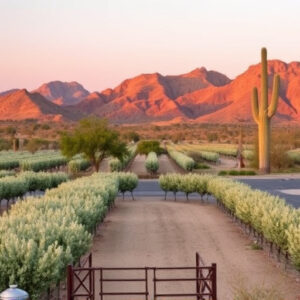Southern Arizona wineries lead in eco-conscious viticulture with ancient dry farming techniques, minimizing irrigation and enhancing grape flavors. This sustainable approach conserves water, fosters healthier root systems, and positions them as innovators in a growing movement to protect the region's natural heritage for future generations of wine enthusiasts.
“Embark on a journey through southern Arizona’s thriving wine industry, where sustainability meets innovation. Explore the unique world of dry farming techniques practiced by local vineyards, showcasing their commitment to eco-friendly practices. This region’s rising number of conscious winemakers is revitalizing the industry. Discover hidden gems among Arizona’s wineries and learn how dry farming enhances grape quality. Additionally, we’ll delve into the impact of tourism on this blossoming ecosystem, highlighting the harmonious relationship between visitor experiences and the preservation of southern Arizona’s vibrant wine culture.”
- Exploring Sustainable Wine Production in Southern Arizona
- Dry Farming: A Unique Approach in Local Vineyards
- The Rise of Eco-Friendly Winemakers in the Region
- Uncovering Hidden Gems: Sustainable Arizona Wineplaces
- How This Farming Technique Enhances Grape Quality
- Tourism's Impact on Arizona's Thriving Wine Industry
Exploring Sustainable Wine Production in Southern Arizona
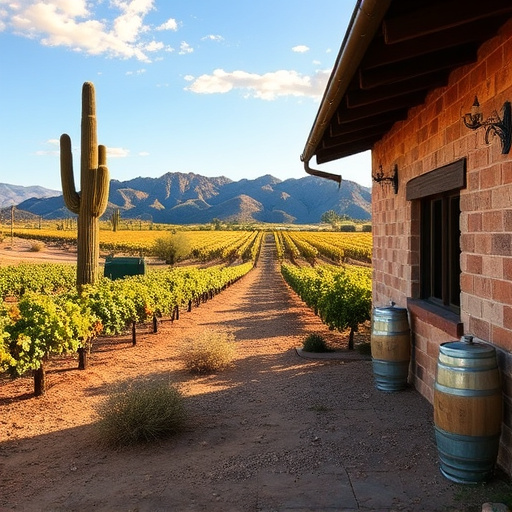
In the heart of Southern Arizona, a captivating landscape unfolds as vineyards embrace sustainable wine production through dry farming techniques. This region, known for its vibrant and bustling wineries, is witnessing a metamorphosis in agricultural practices. The area’s unique climate presents both challenges and opportunities for winemakers looking to reduce their environmental footprint.
By implementing dry farming, local southern Arizona wineries are revolutionizing traditional viticulture. This method involves minimal irrigation, relying on the land’s natural water reserves. It’s not just about sustainability; it’s a dance between the vineyard and the climate, where resilience meets quality wine production. This approach not only conserves water but also fosters a more intricate flavor profile in the grapes, making each bottle a testament to the region’s terroir.
Dry Farming: A Unique Approach in Local Vineyards
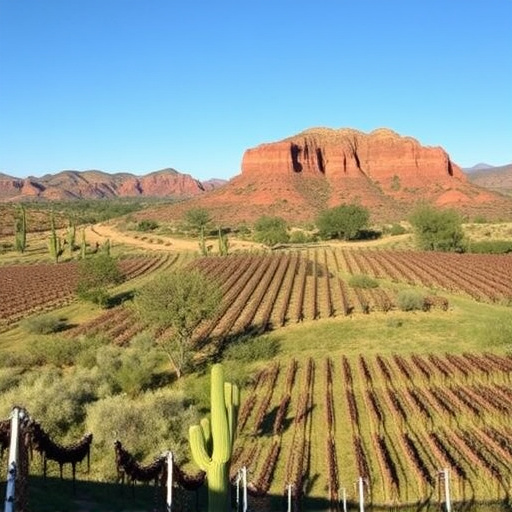
In the heart of Southern Arizona, wineries are embracing a unique and sustainable approach to grape cultivation known as dry farming. Unlike traditional methods that rely on irrigation, dry farmers allow the grapes to draw water from the soil naturally, adapting to the region’s arid climate. This ancient technique not only conserves precious water but also enhances the flavor profile of the grapes, resulting in distinctively vibrant wines.
The vineyards of Southern Arizona, characterized by hot summers and minimal rainfall, create challenging conditions for grapevines. Yet, this harsh environment is precisely what makes dry farming an attractive and effective strategy here. By minimizing external water sources, these local wineries foster a stronger root system that taps into deeper soil reserves, leading to healthier plants and richer fruit. This organic method also contributes to the overall ecological balance of the region, making it a standout feature among southern Arizona wineries.
The Rise of Eco-Friendly Winemakers in the Region
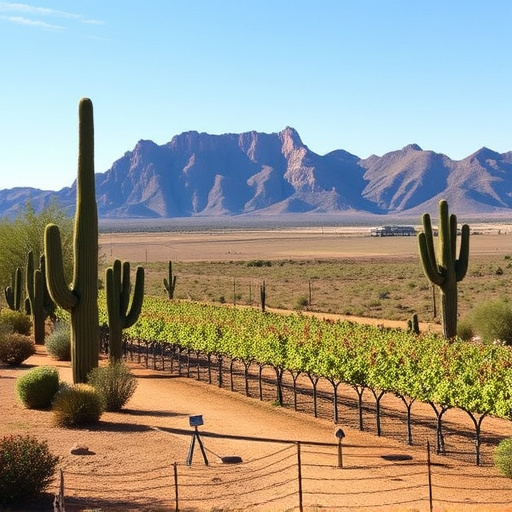
In recent years, there’s been a noticeable shift among southern Arizona wineries toward embracing eco-friendly practices. This rise of green-minded winemakers is not just a trend but a significant movement towards sustainability in the region’s thriving wine industry. Dry farming techniques, where vines rely on natural rainfall rather than irrigation, are gaining traction as producers look to reduce their environmental footprint.
The shift towards sustainability is driven by a desire to protect the delicate ecosystem of southern Arizona and ensure the long-term viability of winemaking. By adopting dry farming, winemakers minimize water usage, reduce energy consumption, and foster healthier soil conditions. This approach aligns with the region’s arid climate, where water conservation is paramount. As consumers become more conscious of environmental issues, southern Arizona wineries are poised to lead the way in eco-conscious viticulture.
Uncovering Hidden Gems: Sustainable Arizona Wineplaces
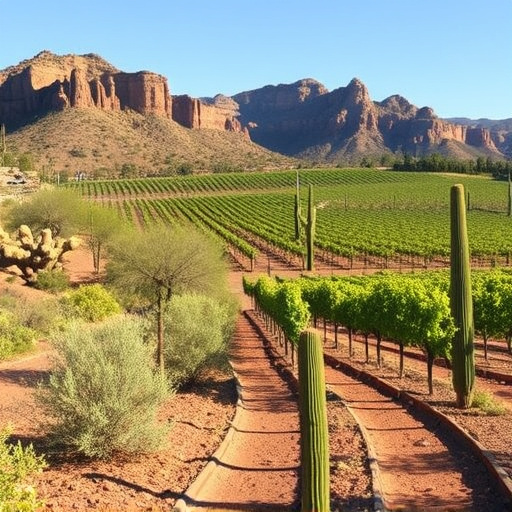
In the heart of southern Arizona, nestled amidst rolling hills and vibrant landscapes, lies an undiscovered realm of sustainable wineplaces that showcase the region’s unique terroir. These hidden gems, often tucked away from the bustling metropolis, embrace ancient farming techniques like dry farming, revolutionizing the way wine is cultivated. By ditching modern irrigation methods, these wineries ensure water conservation while fostering a richer, more complex wine profile.
Exploring southern Arizona wineries offers a refreshing escape for folks seeking authentic experiences. Each vineyard tells a story of resilience and innovation, where the grapes thrive in the region’s natural conditions. These sustainable practices not only enhance the quality of the wines but also foster a deeper connection to the land, making every sip a testament to the dedication and passion of these hidden wine gems.
How This Farming Technique Enhances Grape Quality
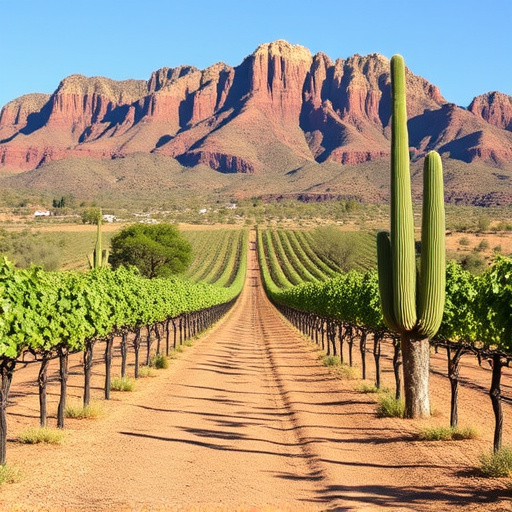
In southern Arizona, wineries are leading the way in sustainable wine production by adopting dry farming techniques. This ancient method, where grapes are grown without irrigation, allows for a slower and more natural ripening process. By relying on rainfall and existing soil moisture, these vineyards ensure that their grapes develop complex flavors and higher sugar levels, resulting in richer wines. The absence of artificial water sources encourages deep root systems, making the vines more resilient to drought conditions and promoting overall vine health.
This farming technique not only enhances grape quality but also contributes to a more sustainable ecosystem. By minimizing external water input, these wineries reduce their environmental footprint and preserve local water resources. Moreover, dry farming supports biodiversity as it promotes a healthier soil ecosystem, benefiting nearby flora and fauna. As southern Arizona’s wine industry continues to thrive, these sustainable practices ensure that the region’s wines remain exceptional while preserving its natural heritage.
Tourism's Impact on Arizona's Thriving Wine Industry
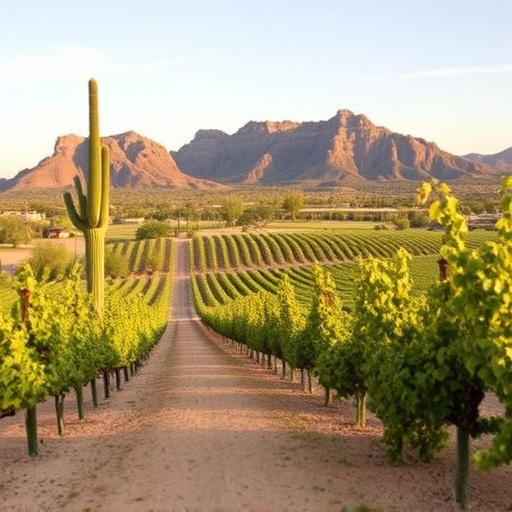
The rise in sustainable tourism has significantly impacted and boosted Southern Arizona’s thriving wine industry, which is renowned for its picturesque landscapes and diverse microclimates conducive to grape cultivation. As visitors seek authentic experiences, they are drawn to the region’s eco-conscious wineries practicing dry farming techniques. This trend not only attracts a new demographic but also fosters environmental awareness among tourists.
Tourism has played a pivotal role in shaping the wine culture here, encouraging producers to adopt innovative and sustainable practices. Many southern Arizona wineries now offer unique tours, allowing visitors to immerse themselves in the art of viticulture and appreciate the region’s distinct terroir. This approach not only educates but also promotes responsible tourism, ensuring the long-term viability of the industry while preserving the natural beauty that makes this wine region so special.
Southern Arizona’s wine industry is not only thriving but also setting an example for sustainable practices, particularly through dry farming techniques. By exploring these eco-conscious vineyards, tourists can discover the region’s hidden gems while supporting environmentally friendly winemakers. The unique approach to grape cultivation enhances both quality and biodiversity, making it a true testament to the potential of sustainable wine production in southern Arizona wineries.
